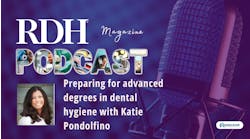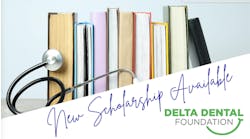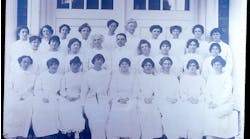by Ann-Marie C. DePalma
As hygienists, we encounter a variety of patient populations. As the diversity of the U.S. population increases, so does the diversity of our patients. It's important for us to be aware of our patients' beliefs and health practices. Their cultural history can provide insight into their health behaviors. All members of the dental team should be aware of patients' customs and practices, and should develop a respect for this diversity.
Susan Callahan Barnard, DHSc, RDH, has developed a program for the dental team to do just that. As a hygiene educator, Susan has presented many topics related to patient assessment and clinical care. Cultural competence has become integrated from numerous perspectives. A person's health beliefs and practices can provide vital information for treatment planning, evaluation, scheduling, and interpersonal communication.
As the demographics of the population changes, with almost 50 percent of Susan's students receiving their primary education outside of the United States, it's important to examine learning styles, and whether or not culture has an influence on learning. Students and patients from various cultures exhibit three primary learning styles - auditory, visual, and hands-on (kinesthetic).
Many students exhibit a combination of these styles. Americans tend to be visual, while international students exhibit behaviors reflective of their fundamental learning style. Verbal and nonverbal communication skills are critical when communicating cross-culturally. Physical contact, eye contact, gestures and acceptable distances differ from culture to culture. For years, language was considered the only difference in communication, but we now realize that nonverbal communication is equally important. Incorporating all this information is important while treating patients and has an impact on the value of the health care.
Susan's program is very interactive, and she asks participants to remember how their grandmothers and mothers cared for them when they were sick. Answers range from chicken soup and Vicks VapoRub to cupping, herbs, and tea leaves. Using these examples, Susan incorporates what hygienists might encounter when dealing with cross-cultural patients. She discusses preventive care models, such as those found in the textbook Dental Hygiene Theory and Practice. She even asks participants to complete a "Value Scale" adapted from Potter and Perry's Fundamentals of Nursing in order to measure how people rate various life experiences. These include health, happiness, a comfortable life, social recognition, freedom, an exciting life, inner harmony, pleasure, self-respect, and a sense of accomplishment.
She is constantly amazed at the variety of results in each group. In addition, she discusses the "Dental Hygiene Cultural Assessment," which evaluates a patient's ethnicity, race, domiciliary history, valued habits, customs and behavior, communication, health beliefs and practices, nutritional factors, sociological factors, psychological factors, and physical characteristics (Darby and Walsh, 2004).
As dental practitioners, we must be sensitive to individual health behaviors and practices. We need to incorporate these values and practices into our recommendations, even if they are not part of our own culture. One practice unique to dentistry is the exfoliation of the primary teeth; there are various customs around the world that are part of this tradition. The tooth fairy is common in the United States, but in other parts of the world it is customary to throw the tooth on the roof, put the tooth in a slipper, or wait for a visit from the magic mouse! The children's book, Throw Your Tooth on the Roof: Tooth Traditions from Around the World by Selby B. Beeler, is a wonderful source of information.
As a presenter, Susan likes to roam and be in the center of the group. This way she receives greater input from participants. She also likes to integrate real cases relating to health care practices and ethics. Many participants have experienced similar situations and challenges, and sharing these enhances the program. Susan provides plenty of handouts so participants can hear the messages rather than spend a lot of time writing.
Susan graduated from Thomas Jefferson University in Philadelphia with a bachelor's degree in dental hygiene. She also received a master's in dental hygiene from Columbia University. As part of her doctoral studies at Nova Southeastern, Susan completed courses in health care for diverse populations and health care for special populations. As the only dental hygienist in the program, she weaved oral health messages to her colleagues from 23 areas of health care, including nurses and nurse practitioners, physician assistants, respiratory therapists, physical therapists, social workers, and counselors. Susan has presented numerous programs not only on cultural competence, but on pediatric dental hygiene, interdisciplinary approaches to care, and clinical evaluation.
Active in ADHA, Susan served on the group's Board of Trustees from 1996-2000, and currently facilitates Strategic Planning for the BOT and the ADHA councils. Access to care issues of the underinsured, especially within the pediatric population, is one of her primary concerns. Early childhood caries is five to six times more prevalent than asthma, according to the Surgeon General's Report on the Oral Health of Americans. Many children do not have adequate access to care and therefore face many challenges.
If she were not a hygienist, Susan would have pursued a career in academic or health law. She describes herself as creative, flexible, and empowering. She likes to go home with new pearls of wisdom from participants, and she believes that interaction is an important part of the learning process. Her least favorite part of presenting is the time constraints and the structure needed for presentations. She would always love another hour to present, regardless of how long the program is!
Passions in her life include renovating her Victorian home, antiquing, and refinishing furniture. Spending time with her husband, Bill, family, friends, and her Old English sheepdog are also favorite past times. Being a mentor and contributing to the education of professionals makes Susan very proud.
Ann-Marie C. DePalma, RDH, BS,has been a clinical hygienist for more than 25 years and is a graduate of the Forsyth School for Dental Hygienists, is active in the Massachusetts Dental Hygienists' Association, and is a Fellow of the Association of Dental Implant Auxiliaries and Practice Management. Ann-Marie has written articles and presents programs on dental implants, TMD, and developmental delays and can be reached at [email protected]





